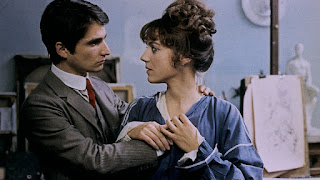A very broad comedy from Truffaut, who clearly wanted to have some fun after the dour melodrama of Anne and Muriel. It’s a vehicle for Bernadette Lafont, who plays a bawdy provincial creating trouble wherever she goes, and using her looks to try and get out of it. Lafont gives a gutsy and energetic performance, matched by quite theatrical comic turns by the rest of the cast. It’s all very silly, but at least it avoids Truffaut’s reflex of ending on a death as a way to manufacture pathos. Here the bodies pile up, and nothing is taken very seriously.
There’s a bit of fun as well with a young cinephile whose amateur footage reveals the truth in a way that individual testimony can’t. The film has a certain Rashomon quality, whereby Camille’s narration doesn’t always tally with what we see in flashback. The film starts with a student looking for the professor’s academic paper and learning it was never published. The narrative is embedded in artefacts, most prominently the tapes the professor uses to record Camille’s story. It’s not as elegant as Citizen Kane, but Truffaut may be nodding to the idea that only something as artificial as the movies can give you the final truth of the matter.
The misunderstandings created by class is an undercurrent in the film – the sociology professor starts off befuddled by the language his subject is using. Truffaut has a snigger at well-meaning intellectuals who try to sympathise with the lot of the downtrodden to the point of excusing criminal behaviour. Camille is a remorseless psychopath, whose irresistible charms manage to get her out of the most outlandish scrapes. Her simps are marks – sometimes it’s that simple. The professor’s assistant is a snob who calls Camille a tramp. But a bit like the friend-zoned Midge in Hitchcock’s Vertigo, she has the professor's best interests at heart, and Truffaut is enough of a romantic to end the film with her, and what might have been if Camille hadn’t bulldozed her chances.




